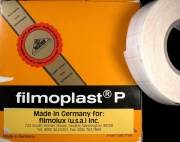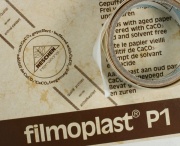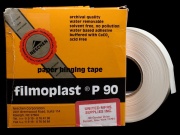Filmoplast tapes
Jump to navigation
Jump to search
Description
[Neschen AG] A registered trademark for a series of transparent adhesive tapes. The Filmoplast tapes use either clear tissue or white paper carriers and a pH-neutral to alkaline, non-yellowing, water-based acrylic dispersion adhesive (Arenstein et al. 2019).
- Filmoplast P: tissue carrier acid-free mending tape
- Filmoplast P1: translucent paper carrier
- Filmoplast P90: paper carrier with gummed adhesive that is a water activated acrylic dispersion
- Filmoplast R: Japanese mulberry paper carrier buffered with magnesium carbonate. It has an acrylic adhesive.
Applications
- Invisible dry mending of paper documents
- Acid-free mending tape for reparing joints or damaged edges
Risks
Some adhesives may yellow and become insoluble with time.
Physical and Chemical Properties
- Filmoplast P: pH = 8.8 (unaged tape) and 8.1 (aged tape)
- Filmoplast P90: pH = 9.1 (unaged tape) and 7.8 (aged tape)
- Filmoplast R: pH = 8.9 (unaged tape)
Additional Information
- www.preservationequipment.com
Links to Oddy Test results posted on AIC Wiki Materials Database Pages for individual materials below
- Filmoplast P90 tested in 2013
- Filmoplast P90 tested in 1997
Resources and Citations
- Rachael Perkins Arenstein, Lisa Goldberg, and Eugenie Milroy, ‘Support and Rehousing for Collection Storage’ In ‘Preventive Conservation: Collection Storage’ Lisa Elkin and Christopher A. Norris (eds.), Society for the Preservation of Natural History Collections, New York. 2019.
- Pam Hatchfield, Pollutants in the Museum Environment, Archetype Press, London, 2002


